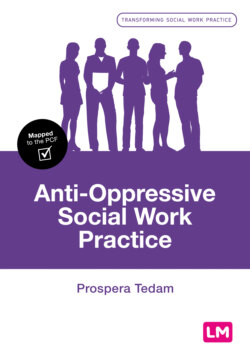Читать книгу Anti-Oppressive Social Work Practice - Prospera Tedam - Страница 75
На сайте Литреса книга снята с продажи.
Homelessness
ОглавлениеSheikh and Teeman (2016) state that rough sleeping and homelessness will rise to 32 per cent by 2026 in the UK, and that homeless families and individuals are confronted with a few other challenges and difficult circumstances. In the area of homelessness, Johnsen et al. (2018) propose five types of power utilised as social control, which comprise measures which seek to mould the behaviour of targeted individuals (p1106). People who are homeless in the UK face multiple challenges and these challenges are exacerbated by other areas of their lives and functioning – for example, addictions and substance abuse, poverty, mental ill health, and many others. For this reason, social workers who may be working in this area are expected to reflect on their own biases and assumptions about homelessness and the causes.
Force strips people of the right to choose and can lead to behaviour change because of the sanctions and punishments associated with non-compliance.
Coercion overlaps with force because there is a threat that benefits will be removed if people are deemed to be non-compliant. The possibility of harsh penalties for non-compliance results in homeless people being left with no choice but to conform for fear of harsh penalties. In the UK, homeless people are said to be more likely to receive Designated Public Place Orders (DPPOs) for street drinking and other public disorders.
Bargaining impacts behaviour by offering incentives usually of a positive nature to affect behaviour change. In order to bargain, one needs a certain degree of power.
Influence involves gentle nudges or persuasion to affect change. Techniques of influencing do not include force or coercion, but rather the use of discussions and dialogue to alter people’s beliefs, values and the desire to change.
Tolerance is the final type of power in the area of homelessness, and this refers to the absence of any planned or defined coercion to conform. It involves an acceptance of the status quo. In relation to homeless service users, tolerance is about services being welcoming regardless of the circumstances of the homeless person.
Considering homelessness on a more global level, parts of the world that have experienced natural or man-made disasters will require their social workers to work within a different power context. Hurricane Katrina, which occurred in New Orleans in the USA in 2005, resulted in 49.6 per cent of citizens becoming homeless, with loss of lives and livelihood. The government response to this crisis was condemned by many, and social workers stepped in to work with many people who were left homeless by the hurricane.
